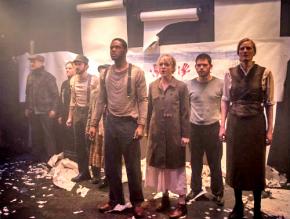Still trapped in the Jungle
reviews Chicago's Oracle Theater production of The Jungle.
ANY THEATER that attempts to stage an adaptation of Upton Sinclair's The Jungle is either going to be brave or stupid. This is to say, if it isn't a smashing success, it's going to be a spectacular failure.
There are a lot of different notes to hit in the original book: humanity mixed with almost unspeakable horrors, a bitter sense of injustice, the wide and oppressive expanse of the world's largest stockyards flowing with the bodily fluids of countless slaughtered creatures, all woven together a keen sense of agitprop that knows when to make itself scarce and let the story speak for itself.
Unless all these notes are hit, and hit loud and clear, you're headed for the failure.
Then there are the pitfalls of exactly how one stages such a play. This, after all, is the story of an immigrant worker whose entire life is destroyed by the cruelties of the meatpacking industry. It would be all too easy for any stage adaptation of this kind to stumble into the mealy-mouthed middle-class trap of "the concern play"--yet another production intended to faithfully stage "the issues" to make its audience feel better about themselves.

That, after all, is what tragically happened to Sinclair's novel. What he had intended as a fiery shot-across-the-bow against the abject inhumanity of capitalism, a rallying cry for working people, ended up receiving the golf clap of genteel reform. A few pieces of legislation were passed, but the bulk of it was directed at food safety, not improved conditions for meatpackers.
In Sinclair's own words: "I aimed at the public's heart, and by accident, I hit it in the stomach." As if to cement this historic irony, the film version of The Jungle--which was agitational enough to be shown at socialist meetings--has now been lost. It isn't difficult to imagine a novel with such a misunderstood soul being presented with an overblown realism that screams at the audience to "please, care!"
SO IS Chicago's Oracle Theater brave or stupid at the end of the day? Brave, thankfully. In fact, they're downright admirable.
Oracle, for the uninitiated, is a tiny black box theater company tucked away in Chicago's Uptown neighborhood, dedicated to providing "free art for all." They're the kind of ambitiously iconoclastic troupe you thought went extinct after the '30s.
And true to form, they have already produced an array of dazzlingly creative and unapologetically radical plays (their recent run of Bertolt Brecht's The Mother, featuring its actors walking on the audience's tables as they surreptitiously passed them notes was, according to many, a true sight to behold).
There is a similar sense of cold inescapability (albeit more mechanized) in The Jungle. Director Matt Foss, who also adapted the script from Sinclair's novel, has taken full advantage of the space's intimacy. Even if there was any room for a realistic treatment of the material, it seems that such notions are seen as more of a hindrance.
There is, again, a big tip of the hat to Brecht here. Large rolls of butcher paper are hung on one side of the stage; throughout the production, the paper is pulled from the walls before being callously crumpled on the floor.
Rather than create a traditional set that attempts to symbolize the cruelty of the Union Stockyards, Foss has employed a set that is as disposable as the characters' lives. Whimsical puppetry, odd props and spattered paint all play a role, as does the occasional song that somehow manages to both remind you that you're in the theater, while organically heightening a mood.
The one possible exception to this unique distancing effect is the acting itself: it is straightforward and naturalistic. Travis Delgado's Jurgis and Stephanie Polt's Ona (Jurgis' wife) keep the story rooted; you can see their pride and hope both mowed under as they try with all their might to keep a grip on their bootstraps. Thomas Wynne's soulless boss Connor is utterly reprehensible precisely because his sliminess isn't stock.
The end result of all of this is a sharp sense of claustrophobia. We can't leave. Nor can we do anything when characters are cheated, swindled, brutalized, even killed. We can't leave; nor can we turn away.
This gets to what makes The Jungle a stunningly effective piece of agitprop theater. It takes its lot as theater seriously first before anything else. And because it is in the end inescapable, its themes and conclusions are willingly engaged with rather than shoved down our throats. In the final moments of the play, Jurgis--and, by extension, the audience--is told that Chicago will one day belong to working people.
It's hard to fathom; by this point, Jurgis has spent time in jail, and has lost his job and home and most of his family. At the time of the novel's publication, the scenes of unionists and radicals making similar declarations may have seemed somewhat far-fetched too, and this was at a time when the far left was considerably stronger than today.
How do such notions play out today, with so many low-wage workers (including those forced into dangerous conditions) starting to push against the sides of the same existential vice as Jurgis?
In all likelihood, these lofty ideals feel much like they did over a hundred years ago. It's not about wanting to fight, it's about having no choice; detached concern isn't an option. We can't escape the horror, the faceless machination of it all, we can't turn away from it either; then as now nothing is left but to try and change it. The ways in which this reality interacts with a production that actually embraces such a stance can be potent. If all The Jungle does is reflect this harsh truth, then it will have succeeded in something most theaters don't even attempt.
First published at Red Wedge.


